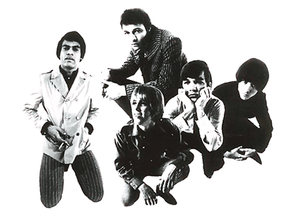Love (band)

Love was an American Psychedelic Rock band of The Sixties. Along with Sly & the Family Stone and the Sir Douglas Quintet, they were among the first multiracial bands.
Love (band) provides examples of the following tropes:
- Cover Version: "Hey Joe," "My Little Red Book"
- Crowning Music of Awesome: The vast majority of Forever Changes (and particularly the first track, Alone Again Or) has had a tremendous impact on future songwriters.
- Epic Rocking: "Revelation", a long jam taking up the entire second side of Da Capo which the band had used in concert to show off their instrumental skills. It was poorly received, and Arthur Lee himself conceded that it was edited too much and unrepresentative of what it sounded like in concert.
- I Am the Band: After Forever Changes, all of the other band members left, leaving Arthur Lee to carry on with a new lineup.
- Lyrical Dissonance: "Alone Again Or" has a bright, sunny chorus about how the narrator will always wait patiently for the one he loves, yet he knows that she won't come for him, leaving him to spend the night alone. He goes on to describe his love for people in general, all knowing that he will remain alone.
- New Sound Album: The melodic and lyrically complex Baroque Pop of 1967's Forever Changes is a major departure from the frantic garage rock of "7 and 7 Is." Though Forever Changes is consistently listed as one of the greatest albums of all time, Love rarely revisited that style of music (a notable exception is 1969's "Always See Your Face," which appears on the High Fidelity soundtrack).
- Protest Song: "The Red Telephone"
- Squick: "The snot has caked against my pants" from "Live and Let Live"
- Subverted Rhyme Every Occasion: "Maybe the People Would Be the Times or Between Clark & Hilldale" accomplishes this by simply dropping words off the end of the line.
- Vindicated by History: They didn't sell very well at the time, but their albums have since been held in high regard by critics and fans.
- Word Salad Lyrics
This article is issued from Allthetropes. The text is licensed under Creative Commons - Attribution - Sharealike. Additional terms may apply for the media files.